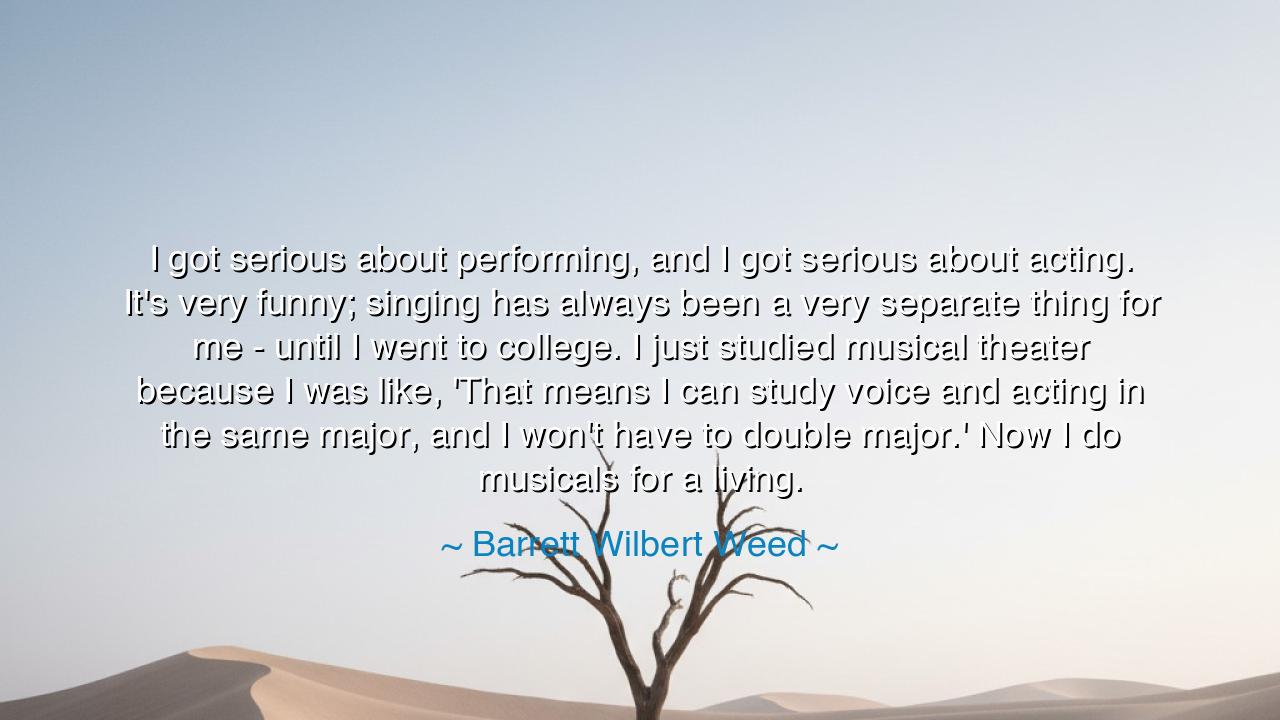
I got serious about performing, and I got serious about acting.
I got serious about performing, and I got serious about acting. It's very funny; singing has always been a very separate thing for me - until I went to college. I just studied musical theater because I was like, 'That means I can study voice and acting in the same major, and I won't have to double major.' Now I do musicals for a living.






“I got serious about performing, and I got serious about acting. It's very funny; singing has always been a very separate thing for me—until I went to college. I just studied musical theater because I was like, ‘That means I can study voice and acting in the same major, and I won’t have to double major.’ Now I do musicals for a living.” Thus spoke Barrett Wilbert Weed, a woman of artistry and fire, whose voice rose from study and struggle to echo upon the grand stages of modern theater. Her words, humble yet profound, reveal an ancient truth: that destiny often reveals itself not through grand design, but through the quiet weaving of our passions, once thought divided, into a single harmonious whole.
When Barrett says, “I got serious about performing, and I got serious about acting,” she describes a moment of awakening—the point at which talent transforms into calling. Many live their lives dabbling at the edges of their gifts, but few take the courageous step into seriousness. For to become serious is not to lose joy—it is to consecrate it. It is the moment the dancer stops moving for amusement and begins to move for truth; when the singer no longer sings to be heard, but to express the unspoken depths of the soul. In this seriousness lies freedom, for it binds one’s energy to purpose, and purpose to creation.
And yet, Barrett’s wisdom deepens when she confesses that “singing has always been a very separate thing for me.” In these words, she unveils the paradox of the artist—the division between gifts that seem separate, but are, in truth, parts of the same flame. Many among the ancients knew this struggle: Leonardo da Vinci, the painter who was also an engineer, a philosopher, a dreamer of flight. He too wrestled with the distance between art and science, between beauty and precision. But Barrett’s story, like Leonardo’s, shows that the true creator learns not to divide, but to integrate—to see that voice and movement, song and character, are but different expressions of one divine impulse: the desire to give form to the invisible.
Her decision to study musical theater was, on the surface, practical—“so I wouldn’t have to double major.” But in that seemingly simple choice lay her destiny. It is one of life’s great ironies that the choices we make for convenience often lead us directly to our calling. The philosopher Heraclitus wrote that the way up and the way down are one and the same. So too, Barrett’s pragmatic path became her sacred one. What began as a way to save effort became the bridge that united her gifts into purpose. In this, her story reminds us that even the smallest decisions, when made with sincerity, may be guided by a hand unseen.
When she concludes, “Now I do musicals for a living,” she speaks not with vanity, but with awe. Her words are the laughter of realization—the joy of one who has arrived where she did not plan to go, yet where she was always meant to be. This laughter, this funny realization, is the sound of alignment—the soul recognizing its own melody in the music of life. It is the same laughter of the poet who discovers his voice in the lines he never intended to write, or the teacher who finds wisdom in the lessons she meant to give others. In Barrett’s “funny” reflection lies the beautiful irony of purpose fulfilled through accident.
Her journey mirrors that of the ancient dramatists, those who blended the sacred and the artistic into one. The Greek actor-priests of Dionysus’ festivals sang, danced, and wept in one act, never dividing emotion from performance. To them, art was not compartmentalized—it was the full expression of the human spirit. Barrett, whether knowingly or not, follows their lineage. Her union of voice and acting is the same union of body and spirit that all artists strive for: to make life itself a performance of truth.
So, dear listener, take from her words this enduring lesson: the parts of yourself you think are separate may one day reveal themselves as one. Do not fear the contradictions within you—your mind and your heart, your logic and your passion, your multiple callings. Pursue them all with seriousness, and trust that time will weave them into harmony. What seems like division now may be the very material of your destiny.
For as Barrett Wilbert Weed teaches, the path to purpose is rarely a straight road—it is a winding song, part voice, part silence, part laughter. Walk it with courage. Study deeply. Love your craft fiercely. And when at last the pieces of your life join together, you too will look back and smile at the funny way fate has turned your scattered gifts into one shining whole.






AAdministratorAdministrator
Welcome, honored guests. Please leave a comment, we will respond soon